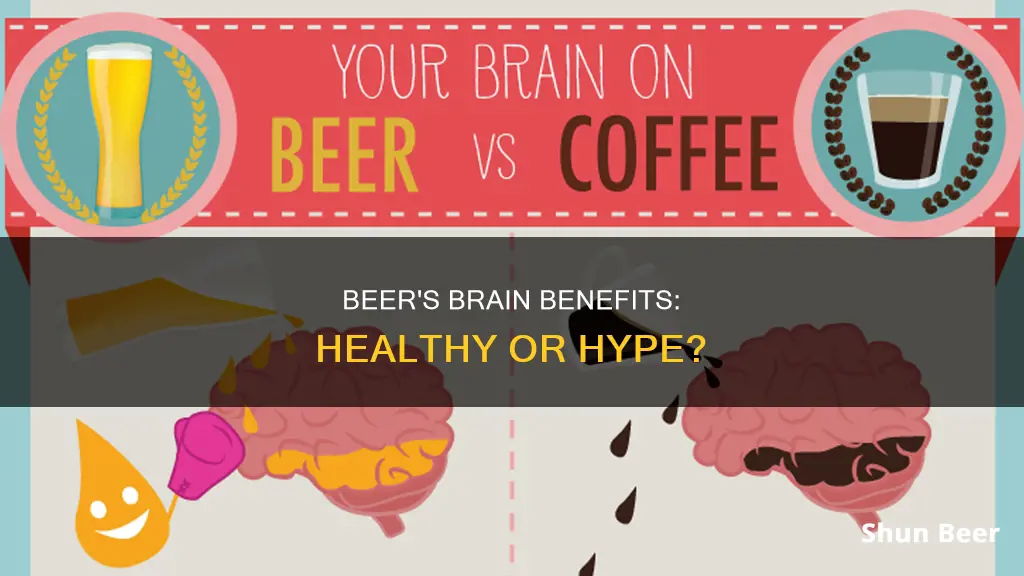
Beer is often viewed as a guilty pleasure, but when consumed in moderation, it may offer several health benefits. One of the most intriguing questions in this area is whether beer is healthy for your brain. While some studies suggest that moderate beer consumption may have positive effects on cognitive function and brain health, other research indicates potential brain-related drawbacks. So, is beer healthy for your brain? Let's delve into the findings and explore the impact of beer on our cognitive well-being.
| Characteristics | Values |
|---|---|
| Memory Function | A flavonoid called xanthohumol, found in beer, improved memory function in young mice. |
| Cognitive Function | Beer may help with cognitive function, but only in younger people. |
| Alzheimer's and Dementia | Moderate beer drinkers are 23% less likely to develop Alzheimer's and dementia. |
| Cholesterol | Beer raises good cholesterol, which improves blood flow to the brain. |
| Brain Aging | A study found that drinking one beer a day was associated with two years of brain aging in a sample of 50-year-olds. |
What You'll Learn

Beer may improve memory function
A flavonoid called xanthohumol, found in beer, has been shown to improve memory function in young mice. However, the dose given to the mice was quite high – the human equivalent of 2,000 litres of beer a day! So, this doesn't mean you should rush out and buy a six-pack. But it does suggest that flavonoids may play a role in helping to form memories and should be studied further.
Several studies have observed a link between limited, moderate drinking and a lower risk of neurological illnesses. For example, the Northern Manhattan Study found that women who sipped one drink per week to two drinks per day scored better on cognitive tests than women who never drank. The English Longitudinal Study of Ageing showed that moderate drinkers performed better on tests of word recall, simple math questions, and identifying dates than non-drinkers. And a meta-analysis of 143 papers on moderate drinking and cognition concluded that light-to-moderate drinking may reduce the risk of dementia and cognitive decline in older subjects.
On the other hand, some studies have associated even light to moderate drinking with cognitive decline. A recent study by the University of Pennsylvania found that the more individuals reported drinking, the stronger the association with loss of brain matter. Another study by the University of Oxford showed that moderate drinkers had three times the risk of hippocampal shrinkage compared to non-drinkers. However, the meaning of these MRI scan results is still unclear, as this type of atrophy shows major improvements when alcoholics stop drinking, indicating that it may not be caused by brain cell death.
In conclusion, while some research suggests that beer may improve memory function, the overall evidence is mixed. More studies are needed to determine the true effects of moderate drinking on memory and cognition.
Shots vs Beer: Which is the Healthier Alcoholic Drink?
You may want to see also

Beer may reduce the risk of dementia
Research suggests that moderate alcohol consumption may have a protective effect on brain health. For example, a study by researchers at Loyola University in Chicago found that moderate beer drinkers were 23% less likely to develop Alzheimer's and dementia. Another study presented at the American Heart Association Scientific Sessions in 2016 followed 80,000 participants for six years and found that moderate drinkers had slower declines in "good" cholesterol levels, resulting in a lower risk of cardiovascular diseases and improved blood flow to the brain.
However, it is important to note that the relationship between alcohol consumption and brain health is complex. While moderate drinking may offer potential benefits, excessive drinking can lead to negative consequences, including reduced brain volume and an increased risk of dementia. Additionally, individual responses to alcohol may vary, and drinking guidelines should always be followed to maintain overall health and well-being.
Beer and Liver Health: Exploring the Connection
You may want to see also

Beer may lower the risk of Parkinson's disease
The link between Parkinson's disease and alcohol consumption is complex and not yet fully understood. While some studies have shown no link between the two, others suggest that moderate alcohol consumption may reduce the risk of developing Parkinson's disease.
Beer consumption, in particular, has been associated with a reduced risk of Parkinson's disease. A meta-analysis found a protective effect against the disease from drinking alcohol, and specifically beer. Every 13 grams of alcohol per day might be associated with a 5% decrease in Parkinson's disease risk. However, more research is needed to confirm this finding and understand the underlying mechanisms.
It is important to note that excessive alcohol consumption or chronic alcohol misuse can have negative health consequences and may worsen symptoms of Parkinson's disease in those already diagnosed. The current recommendation is to consume alcohol in moderation, which is defined as up to one drink per day for women and up to two drinks per day for men.
Beer and Diabetes: What's the Verdict?
You may want to see also

Beer may improve cognitive performance
Beer has been linked to improved cognitive performance in several studies. While excessive drinking is associated with an increased risk of dementia, moderate drinking – defined as no more than one drink per day for women and up to two drinks per day for men – has few ill effects and may even have some benefits.
Brain Health Benefits of Beer
A flavonoid called xanthohumol, found in beer, has been shown to improve memory function in young mice. While the dose given to the mice was quite high – the equivalent of 2,000 litres of beer a day for a human – the research suggests that flavonoids may play a role in helping to form memories.
Beer also contains purine, a chemical compound that may combine with ethanol to produce more urate, an acid that devours harmful free radical molecules that can contribute to ageing and have been linked to a lower risk and slower progression of Parkinson's disease. Beer is also a good source of niacin, or vitamin B3, which has been reported to reduce the risk of Parkinson's disease.
Studies on Alcohol and Cognition
The Northern Manhattan Study, which looked at 2,215 men and women with an average age of 69, found an association between moderate alcohol consumption and better cognitive performance in women. The English Longitudinal Study of Ageing, which evaluated the drinking habits and cognitive abilities of 6,005 people aged 50 and older, found that moderate drinkers performed better on tests of word recall, simple math questions, and identifying dates than non-drinkers.
A 2011 meta-analysis of 143 papers on moderate drinking and cognition published in Neuropsychiatric Disease and Treatment concluded that "light to moderate drinking does not appear to impair cognition in younger subjects and actually seems to reduce the risk of dementia and cognitive decline in older subjects."
However, it is important to note that no study has shown a cause-and-effect link between alcohol and its potential benefits, and health experts do not recommend that non-drinkers start drinking. Excessive consumption can negate the protective effects of moderate drinking.
Sour Berry Beers: Healthy or Not?
You may want to see also

Beer may reduce the risk of stroke
Beer has a number of health benefits when consumed in moderation. However, there is conflicting evidence as to whether or not beer can reduce the risk of stroke.
Some studies have shown that moderate drinking can lower the risk of ischemic stroke. Ischemic strokes are the most common type of stroke and are caused by a blood clot blocking the flow of blood and oxygen from reaching the brain. Moderate drinking has been shown to be associated with lower levels of fibrinogen, a protein that helps form blood clots.
On the other hand, heavy drinking can increase the risk of hemorrhagic stroke. Hemorrhagic strokes occur when an aneurysm bursts or a weakened blood vessel leaks, resulting in bleeding inside the brain. Heavy drinking can also increase the risk of intracerebral hemorrhage and subarachnoid hemorrhage, two types of hemorrhagic strokes. Additionally, drinking alcohol can lead to high blood pressure, which is a risk factor for stroke.
Therefore, while moderate drinking may lower the risk of ischemic stroke, heavy drinking can increase the risk of hemorrhagic stroke. It is important to drink in moderation and be mindful of the potential health risks associated with excessive alcohol consumption.
Exploring the Fine Line: Beers and Health
You may want to see also
Frequently asked questions
Research suggests that moderate drinking may protect against cognitive decline and dementia. However, excessive drinking is linked to an increased risk of dementia.
Beer contains a flavonoid called xanthohumol, which has been found to improve memory function. Beer also contains silicon, which helps protect your brain from compounds thought to cause cognitive diseases.
Moderate alcohol consumption is defined as having one drink per day for women and up to two drinks per day for men. It is important to note that heavy drinking is associated with negative health effects, and the benefits of moderate drinking may not outweigh the risks.
Yes, beer may also help lower the risk of diabetes, improve heart health, and strengthen bones. Beer also has nutritional value, containing protein, B vitamins, phosphorus, folate, and niacin.







